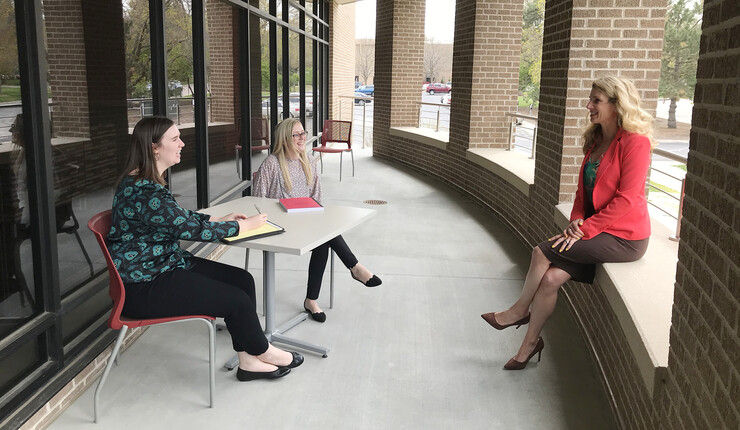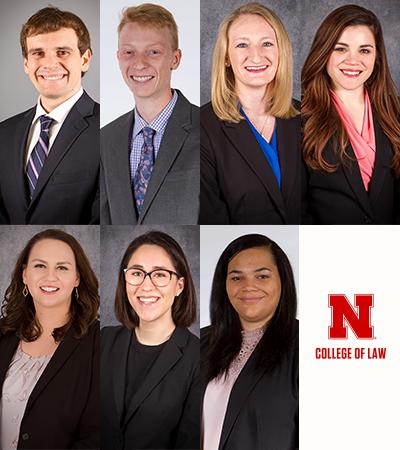
Students Recognized as Outstanding Law Student Advocates by Nebraska State Bar Association
18 May 2021
Seven Nebraska Law students were recognized with the Nebraska State Bar Association (NSBA) Tenant Assistance Project Outstanding Law Student Advocate Award: Taylor Hayes, Hannes Zetche, Amy Sonnenfeld, Lydia Mann, Tessa Lengeling, Sarah O’Neill and Deanna Hobbs. This award recognizes law students each semester who have made a significant contribution to the Tenant Assistance Project (TAP) and exceed expectations in their effort to support the program and contribute to its success.
NSBA has recognized students retroactively for their participation in TAP in 2020.
Spring 2020 Tenants Assistance Project Outstanding Law Student Advocate Award
Taylor Hayes, ’20, and Hannes Zetzche, ’20, were named co-recipients for the Spring 2020 semester for their contributions in the development of the Tenants Assistance Project. The team developed processes and forms to support the program, observed eviction proceedings and attended meetings with local and national housing advocates. They also conducted research on the feasibility of the program, and into the relevant laws and rules applicable to evictions. Hayes and Zetzche were the first law students to participate in the TAP program.
Summer 2020 Tenants Assistance Project Outstanding Law Student Advocate Award
Amy Sonnenfeld, ’21, and Lydia Mann, ’21, were named co-recipients for the Summer 2020 term. Each represented numerous tenants throughout the term and regularly volunteered to cover additional shifts or take on additional packets. Sonnenfeld and Mann both continued to support TAP after their time in the Clinic had ended.
Fall 2020 Tenants Assistance Project Outstanding Law Student Advocate Award
Tessa Lengeling, ’21, and Sarah O’Neill, ’21, were named co-recipients for the Fall 2020 semester. During this time, they evaluated nearly 100 eviction matters and assisted over two dozen tenants at the courthouse. Due to their additional volunteer hours, they were able to handle complex eviction matters and assist several families avoid eviction. Both Lengeling and O’Neill continued to volunteer over the holiday break and into the Spring 2021 semester.
Spring 2021 Tenants Assistance Project Outstanding Law Student Advocate Award
Deanna Hobbs was named the recipient for the Spring 2021 semester, for her unmatched dedication and enthusiasm to TAP. Hobbs began volunteering for TAP during the holiday break, over a month before her work began in the Clinic. The experience Hobbs gained allowed her to handle cases solo, and she often found herself in a position to mentor other law student volunteers. In her work, she was extremely thoughtful in her analysis of each case, always zealously advocating for her clients’ interests. During her time working with TAP, Deanna developed great rapport with opposing attorneys and the bench.
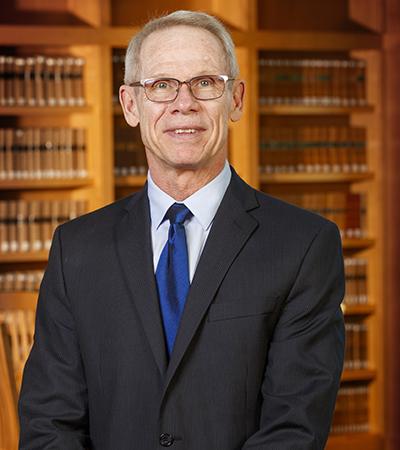
Centner’s Article Accepted by Lewis & Clark Law Review
17 May 2021
Professor Terence Centner’s article Reconciling Agricultural Production and Property Rights with the Use of Dicamba Herbicides was accepted by the Lewis & Clark Law Review.
The abstract for the article is below:
With the approval of three dicamba products for soybean and cotton crops in 2017, producers had an herbicide that would control glyphosate-resistant weeds. Within four years, sixty percent of the soybean acreage was being sprayed with a dicamba product. However, dicamba products have a volatility problem. Spray drift and volatile emissions can injure neighboring crops and vegetation. An estimated forty million dollars of damages from dicamba spraying were being inflicted on neighbors each year and the uncompensated injuries were straining the social fabric of rural communities. Due to these costs, a federal circuit court vacated three dicamba registrations in 2020, yet the Environmental Protection Agency issued new registrations five months later.
In providing producers of soybeans and cotton a profitable mechanism for weed control, dicamba herbicides have altered traditional property rights. The ownership rights of nearby properties have been diminished due to the inability to exclude pesticide drift. Moreover, legal remedies are impracticable due to the burden of proof and cost of litigation. To respond to these circumstances, an insurance program may be proposed in the form of a state dicamba compensation program. The program would impose a fee on dicamba products and use the funds to compensate property owners suffering injuries. Through this insurance program, property losses would be compensated yet dicamba products could quality for registration. Producers who choose to use dicamba products would pay for the related injuries.
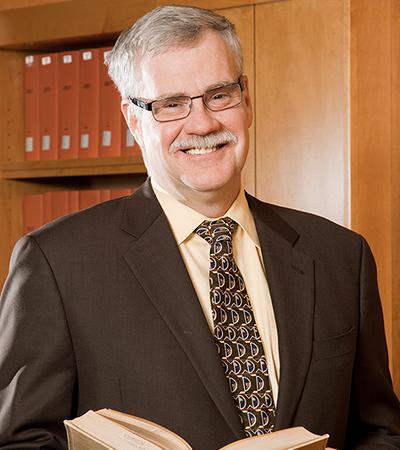
Lenich Publishes Book on Nebraska Civil Procedure, Shares Work with Nebraska Courts
17 May 2021
In March, Thomson Reuters (West) released the 2021 edition of Professor Lenich’s book, Nebraska Civil Procedure. The book provides an in-depth analysis of the procedural rules that govern the litigation of a civil action in Nebraska. The book covers jurisdiction, venue, statutes of limitation, proper parties, joinder, interpleader, intervention, pleading, service, motions to dismiss, interlocutory injunctions, discovery, trial procedure, new trial motions, judgments, default judgments, voluntary dismissals, vacating judgments, and a number of other topics. The book is available electronically on Westlaw.
Professor Lenich also made a presentation at the April 23 Nebraska Appellate Courts Spring Education Program titled “More Than Meets the Eye: Appellate Court Awards of Attorney’s Fees.” The presentation focused on when courts may award attorney’s fees for services rendered on appeal and the methods courts may use in determining the amount of fees to award. Among those attending were the Justices of the Nebraska Supreme Court, the Judges of the Nebraska Court of Appeals, and their clerks.
In his opinion in Porter v. Porter, 309 Neb. 167 (2021), Chief Justice Heavican cited Professor Lenich’s article on final orders and referred to him as a “respected commentator.”
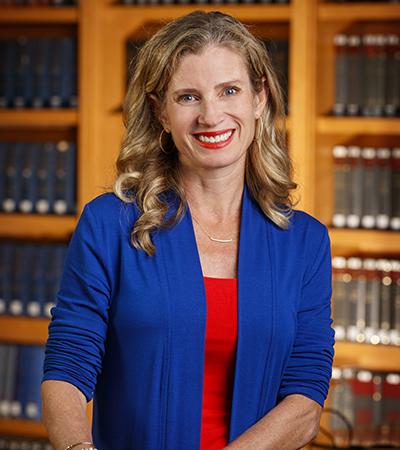
Children’s Justice Clinic serves Nebraska, educates law students
13 May 2021
Law students at the University of Nebraska–Lincoln have a unique opportunity to serve the community’s most vulnerable, while getting real-time court experience.
The Children’s Justice Clinic at the College of Law serves abused and neglected children in Lancaster County, and third-year students take on cases as the guardian ad litem.
In Nebraska, the guardian ad litem is the attorney who represents the child in juvenile court, separate from the social worker and county attorney who may be working on the case, too, said Michelle Paxton, director of the clinic.
Since its inception, the clinic has garnered a reputation for high quality advocacy, and as good working partners with community organizations, including the County Attorney’s Office, the Department of Health and Human Services and Legal Aid.
“On any one case, a student attorney will work with a variety of professionals in different capacities, which helps build their skills to work with others and navigate many different personalities and positions,” Paxton said. “We are known for providing high-quality advocacy for our clients.”
About eight students are accepted to be part of the program annually, and then team up into groups of two to work between eight and 12 cases a year. As students work through a case, they conduct an investigation, which involves interviewing all parties involved, getting to know the families they’re working with, and figuring out what the children need and representing those findings in court.
There is no typical situation, Paxton said, but students can expect to spend months on a case. Paxton oversees all of the cases, giving advice and lending her expertise to the students, monitoring them in court hearings and evaluating their work.
Paxton receives referrals for cases and she goes through them to decide which ones would work best for the students, as well as how much the families can benefit from the services offered by the clinic.
Paxton, previously a county attorney with Douglas and Lancaster counties, launched the clinic in 2017 after working with the Center on Children, Families and the Law at Nebraska.
“CCFL provides comprehensive training to all child welfare workers and works to improve systems and outcomes for children and families,” Paxton said. “It was there that I recognized the need for lawyers to receive the same kind of training, through the lens of the law so that they can be better advocates.”
Prior to taking on casework, the students undergo rigorous training, which is a key part of the clinic’s mission to provide high-quality advocacy for children.
“What makes our program unique is it’s a partnership between the College of Law and the Center on Children, Families and the Law (at Nebraska) to ensure that students interested in this type of work receive the training and skills necessary to be high quality advocates for children,” Paxton said. “When you’re representing children, that means understanding the complex circumstances that families are facing when they enter the juvenile system. The partnership with CCFL allows students in the program to receive over 70 hours of expert training on all sorts of matters that are relevant to the work, including substance use, domestic violence, poverty, trauma and child development.”
The trainings continue throughout the semester with weekly sessions on certain topics. The students gain much from the training, beyond what they’ve learned in their law classes to that point.
“Going through law school, you might see things as very black and white, and I think the clinic training does a great job at showing there are shades of gray, and reasons behind why families might find themselves in these particular circumstances, whether it be domestic violence, substance abuse, mental illness or poverty,” Claudia Brock, a May 2021 graduate and clinic attorney, said. “The level of training we receive allows us to address those complexities and think really comprehensively about services we can offer children and assistance to the family as a whole.”
The work is difficult. Working with families going through some of the worst moments of their lives can take an emotional toll. Paxton said the camaraderie among the students and the ability to work on cases in teams helps. She also incorporates Reflective Practice, where students meet and have facilitated conversations about their cases. Paxton said the conversations are meant to acknowledge the thoughts and feelings the students may be having related to their casework. Acknowledging the feelings and working through them helps to ensure the students don’t allow negative emotions to affect their decision-making.
“That gives us a space to talk about some of the struggles that we’re facing and communicate with others in the clinic, who may be experiencing the same things and can give advice,” said Rachel Lowe, a May 2021 graduate and clinic attorney. “That’s been tremendously helpful, but it is hard. There are situations that are very eye-opening, but that’s what makes the Children’s Justice Clinic very rewarding. You get to work with and interact with these families and hopefully advocate for better lives for them.”
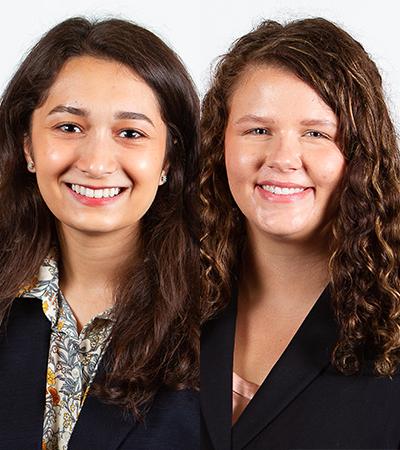
Naseem and Sandberg win 75th Annual Allen Moot Court Competition
04 May 2021
Natasha Naseem, ’22, and Marley Sandberg, ’22, are the winners of the 75th Annual Thomas Stinson Allen Moot Court Competition, beating six other teams in the intraschool competition.
To participate in the Allen Moot Court Competition, teams are asked to submit a written brief of a case. This year, the case concerned a prisoner suing a penitentiary, with issues arising under the Prison Litigation Reform Act and a First Amendment censorship violation.
During the oral argument portion of the competition, each team is asked to argue twice in the preliminary round, taking both appellant and appellee positions. The four highest scoring teams move on to the semifinal round. This year, Judge Grasz, ’89, Judge Buesher, Judge Zwart, ’88, and attorney David Bargen, ’04, served as semi-finals judges.
The team of Naseem and Sandberg argued against Marc Sisson, ’22, and Trevor Rogers, ’22, in the final round. Best oral advocate, chosen from the performances in the final round, was awarded to Naseem. Nebraska Supreme Court Judges Justice Freudenberg, ’95, Justice Funke, ’94, and Justice Papik, served as the judges during the final round.
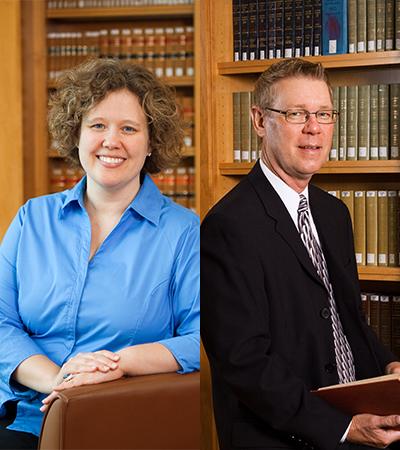
Nebraska Access to Justice Commission Named 2021 Robert M. Spire Public Service Award Recipient
30 Apr 2021
The Nebraska Access to Justice Commission, formed by the Nebraska Supreme Court in 2017, received the Omaha Bar Association’s 2021 Robert M. Spire Public Service Award.
Professors Stefanie Pearlman and Kevin Ruser, along with several Nebraska Law alumni and area attorneys serve on the Commission upon appointment from the Chief Justice of the Nebraska Supreme Court.
The Nebraska Access to Justice Commission promotes the Nebraska Supreme Court’s goal of providing equal access to swift, fair justice for all Nebraskans regardless of income, race, ethnicity, gender, disability, age or language. The Commission has four standing committees: Self-Represented Litigation Committee; Committee on Equity and Fairness; Consortium of Tribal, State, and Federal Courts; and Language Access Committee.
Additional information about the Robert M. Spire Public Service Award and acceptance videos from the Commission’s committee chairs are available on the Omaha Bar Association’s website.
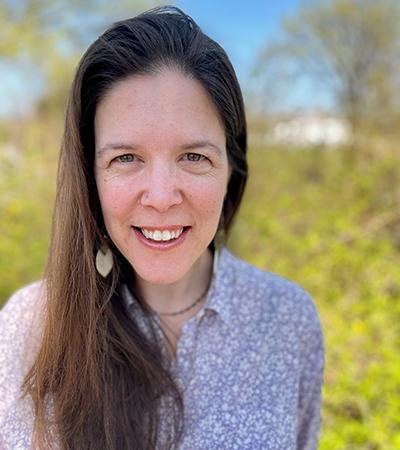
Shoemaker earns Carnegie Fellowship to explore rural futures
28 Apr 2021
Rural America is at a critical point — in the past, a vision of bucolic agrarianism; ahead, increasing industrialization and absentee land ownership that raises serious questions about its future. It’s also at the heart of many grand global challenges, ranging from climate change to racial justice. A Nebraska law professor will explore rural America’s challenges and opportunities as a 2021 Andrew Carnegie Fellow.
Jessica Shoemaker is only the second University of Nebraska–Lincoln faculty member to receive the prestigious honor — and one of 26 nationwide this year. The award grants each recipient $200,000 over two years to complete a major project. Winners were chosen by a jury from a pool of over 300 nominees.
“I am thrilled that Professor Shoemaker and her work have been recognized by the Carnegie Foundation of New York,” said Richard Moberly, dean of the University of Nebraska College of Law. “In so many ways, Professor Shoemaker’s work is directly tied to the college’s mission, but perhaps most importantly, her work will address critical issues facing our state and our country.”
Shoemaker’s project is titled “Remaking a Land of Opportunity: America’s Rural Future.”
“Modern agriculture is highly industrialized and increasingly characterized by concentrated, absentee land ownership. Many rural places face a crisis of depopulation, political alienation, environmental decline and racial injustice,” she said. “While 98% of farmlands are owned by people who are white, the people who work the low-wage, often dangerous agricultural sector jobs are overwhelmingly not white and more likely to live in segregated rural geographies of concentrated, persistent poverty. This project analyzes the overlooked role of property law — including our most fundamental land-tenure choices — in constructing these dynamics.”
Shoemaker grew up in Iowa, “always closely connected to and interested in farming and food and with a real sense of the importance of long-term connections to particular places that held meaning in my family,” she said.
“Those were really formative experiences, but I also always emphasize that I don’t think having this kind of rural pedigree is a prerequisite to caring about and having an interest in these rural landscapes. The past, present and future of the American countryside is right at the heart of so many of our grand global challenges, from climate change to racial justice.”
As current farmers age, up to half of American agricultural lands are expected to change hands in the next two decades, Shoemaker said. Current law strongly encourages existing, aging farmers to hold onto these lands until their death, and upon transfer, these lands now often go to absentee heirs or outside investors. Meanwhile, a crowd of emerging beginning farmers — farmers of color, in particular — seek to build smaller, more sustainable farming operations but are increasingly locked out of secure, affordable land access.
“These new farmers consistently cite lack of access to land as their most significant entry obstacle, and most existing policy efforts have only tinkered at the edges by encouraging a few discrete transactions within existing systems,” Shoemaker said. “After years of working to understand the problem, both on the ground and in the legal academy, this project marks a different path. Drawing on experiences of successful property-system reforms in context as diverse as housing justice movements in the American urban core, to the renegotiation of Indigenous property relationships in western Canada, this project ultimately unleashes the imaginations of scholars, lawyers, farmers and farm advocates to make a map for rebuilding rural places as the equitable, sustainable and diverse landscapes they can be.”
Shoemaker’s research focuses on how property law and land-tenure designs shape how we live together as communities and the ecological systems we live within. She has taught a range of courses related to property and land tenure, as well as Native American law and a seminar in energy and rural development.
Over the next two years of her Carnegie fellowship, Shoemaker plans:
- A book project that will combine legal scholarship with humanistic storytelling to make the case, simply, that property law choices are choices, and that alternative land-tenure designs and property law reforms exist that can better serve these overlooked people and places.
- An interdisciplinary research initiative: The Rural Reconciliation Project. This project is embryonic now but, with fellowship support, shows potential to grow into a sustainable, ongoing research collaboration with Shoemaker’s co-creator, law professor Anthony Schutz. The project seeks to bring together scholars across institutions and disciplines, as well as on-the-ground stakeholders, to pursue a new rural future and promote relationship repair across rural and urban divides. The project will soon include a regular seminar series, an expanded online and social-media presence, and a spring 2023 symposium for scholars and stakeholders.
- A new graduate-level course that she will develop and hopes to teach in spring 2023 for students of law, economics, sociology, political science, agronomy and other subjects. This teaching component will facilitate broader early-career interdisciplinary engagement at Nebraska and beyond on complex issues related to rural futures.
“The work I plan to do with my Carnegie Fellowship all flows from experiences I had in practice before becoming a professor, too, including at a farming-focused nonprofit with an early-career public-interest fellowship,” she said.
“The U.S. is really at a turning point when it comes to who owns agricultural land and, more broadly, what kind of rural communities we want to have, whether we will address racial injustice in our food system, and whether our collective environmental choices will be sufficient to preserve healthy landscapes for the future,” Shoemaker said. “I hope my work will highlight how critical and pressing these issues are and, at the same time, inspire some creativity and imagination about the kinds of futures we can build together.”
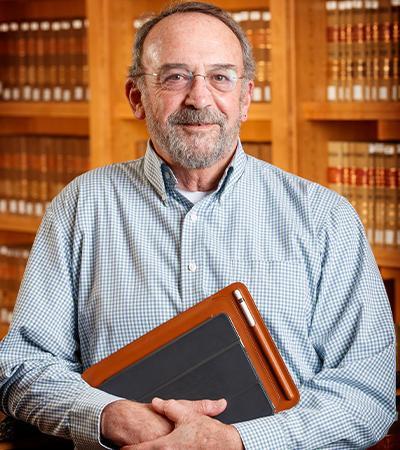
Leiter Appointed to Depository Library Council by U.S. Government Publishing Office
20 Apr 2021
The U.S. Government Publishing Office (GPO) today announced the selection of Richard A. Leiter as a new member of the Depository Library Council (DLC). He will serve on the DLC for the 2021-2024 term.
The DLC serves as an advisory committee to the Director, GPO and the Superintendent of Documents.
“I’m honored to have been selected to the DLC, and I thank the GPO for giving me the opportunity to serve,” Leiter said. “I look forward to working with the GPO and other government information advocates to work for optimal ways for making vital government information widely available to our nation’s citizens.”
As a member of the DLC, Leiter will provide guidance to GPO’s leadership on issues related to future trends and innovations in libraries, public access to government information, and the evolving needs of libraries in the Federal Depository Library Program (FDLP). The FDLP is a network of more than 1,100 libraries—including 200 law libraries—committed to ensuring no-fee public access to government information. During the COVID-19 pandemic, GPO’s partnerships with libraries across the country have played a crucial role in connecting members of the public with online government information and resources.
The Schmid Law Library is a Selective Federal Government Depository.
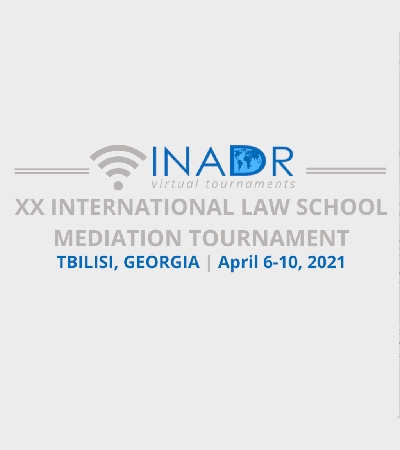
Nebraska Law Mediation Team Finishes Second in International Academy of Dispute Resolution Competition
12 Apr 2021
The University of Nebraska College of Law Mediation team finished second during the 2021 virtual INADR International Law School Mediation Competition. Nebraska students demonstrated exceptional advocacy skills among the field of 40 teams from the United States, Canada, Europe and Asia, finishing as the highest-ranking American team.
Earlier this year the team competed in the Mediation Competition hosted by the American Bar Association Section of Dispute Resolution.
This year’s team includes: Anna Bauerle, ’21; Taylor Christopher, ’21; Martin Fischer, ’22; Curtis Fuller, ’21; and Aja Martin, ’21. The team is coached by Professor Kristen Blankley.
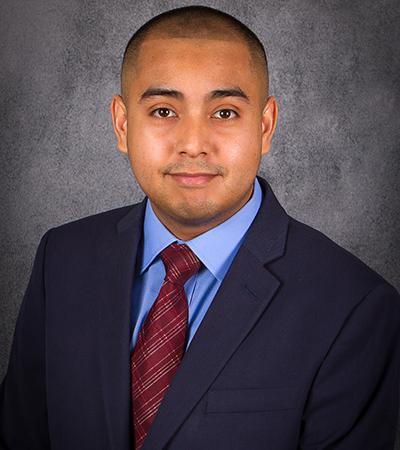
Murga Rios Named Recipient of 2021 Student Award for Outstanding Impact through Public Service
12 Apr 2021
Mauricio Murga Rios, ’21, has been named the recipient of the 2021 Student Award for Outstanding Impact through Public Service. The breadth of Murga Rios’ efforts toward pro bono and his sustained dedication toward pro bono and public service work stood out to the Pro Bono Committee.
During his time at the College of Law, Murga Rios has completed more than 100 hours of pro bono service, approximately half of which he completed as a first-year law student. His participation in College’s community service activities has ranged from participating in the Lincoln Paint-a-Thon to teaching students during the Community Legal Education Project’s Constitution Day activities to preparing taxes as part of Volunteer Income Tax Assistance (VITA) program.
Murga Rios spent his first law school summer helping immigrants fleeing from violence in their home country remain in the United States. Last summer, as a Nebraska Public Interest Law Fund recipient, he worked for the L.A. County Public Defender Immigration Unit where he equipped criminal defense attorneys with the resources necessary to preserve their immigrant clients’ status and/or eligibility for future immigration relief. Now in his final semester at Nebraska Law, Murga Rios represents low-income immigrants as part of the College’s Immigration Clinic. His efforts and the resulting impact in the area of pro bono while at the College of Law have been nothing short of exceptional.
Each year the Pro Bono Committee presents a student with an award for his or her outstanding impact through pro bono service. The impact may be measured by reviewing a single act or project, or multiple acts or projects performed by the student during their enrollment at the College of Law. Criteria to be considered may include, but is not limited to: total pro bono hours, record of pro bono worked performed, and the overall impact the pro bono work has had on a community or underserved population.

Nebraska Governance and Technology Center Announces $50,000 in Supplemental Research Grants
06 Apr 2021
The Nebraska Governance and Technology Center has announced a $50,000 investment in existing projects across the University of Nebraska–Lincoln through Supplemental Nebraska Governance and Technology Center Research Awards.
The awards will provide $10,000 to supplement existing research funding to teams that are already engaged in active internally- or externally-funded research at the University of Nebraska–Lincoln. These supplements will facilitate consideration of law and policy topics relating to ongoing research.The goal of NGTC Supplemental Research Awards is twofold: in the near term, to encourage researchers developing new technologies to consider potential policy aspects of their research and, in the longer term, to facilitate new interdisciplinary collaborations.
NGTC studies the ever-changing relationship between law and technology — how the law can regulate technology and how new technologies affect what the law can do.
“Much of how our society operates is structured around how technologies work, often through legal and policy mechanisms,” said Gus Hurwitz, professor, founder and Menard Director of the center. “Studying the relationship between the technologies that shape our society and the legal and political structures that result (that is, technology governance) is a fundamentally interdisciplinary endeavor.”
As such, the selected projects come from a variety of colleges and disciplines.
The following is a list of awardees:
-
Law and Policy Analysis of AI-Driven Health Technologies, led by Ming (Bryan) Wang from the College of Journalism and Mass Communication. Other team members on this project are Mohammad Hasan, Department of Computer Science and Engineering, and Kelly Cawcutt, Division of Infectious Diseases and Pulmonary & Critical Care Medicine at the University of Nebraska Medical Center.
-
Legal Challenges Impeding State DOT Investment in Connected and Automated Vehicle Technologies, led by Cody Stolle, with contributions from Ricardo Jacome and the faculty and staff of the Midwest Roadside Safety Facility, a non-profit academic research institution at Nebraska and part of the umbrella of the Nebraska Transportation Center.
-
Linking Policy, Land Use Land Cover Change, and Weather and Climate in Nebraska, led by Rezaul Mahmood, School of Natural Resources, Public Policy Center, Department of Agricultural Economics, with team members Tarik Abdel-Monem, Lilyan Fulginiti and Richard Perrin.
-
Public Insights Lab at the College of Journalism and Mass Communication, led by Valerie Jones.
-
Electrified Transportation Initiatives in Nebraska, led by Moe Alahmad, Durham School of Architectural Engineering and Construction, with support from Ahmad Almaghrebi, Subhaditya Shom, Kevin James, and in conjunction with the Nebraska Community Energy Alliance.
NGTC hopes to continue to support researchers again in the future. Interested groups can learn more on the center’s website or contact its executive director, Elsbeth Magilton, at elsbeth@unl.edu.

Digital Divide Projects Announced for 2021
06 Apr 2021
The rural digital divide is one of the most pressing, and difficult to solve, public policy issues in America today. Since 2018 the Space, Cyber, and Telecommunications Law program, now with the Nebraska Governance and Technology Center (NGTC), has hosted a local, regional, and national stakeholder roundtable for the telecommunications industry led by Professor and Director Gus Hurwitz.
This ongoing work brings together experts from around the country who have been involved in digital divide policy, to discuss the challenges and potential solutions to this problem. Through a series of roundtables and student opportunities, NGTC capitalizes on our location and local relationships to advance this issue. The goal remains to foster organic, candid discussion between stakeholders, who may not often have the opportunity to interact and to encourage research on this important issue. Continuing in this tradition, we recently announced support for new projects, as part of the 2021 Roundtable. These project authors will meet virtually to workshop and discuss their work, as well as record podcast episodes with the center highlighting their research impact.
- Jacob Manlove, Arkansas State University, Impacts of Broadband Availability in Arkansas Public Schools During the Covid-19 Pandemic: A Survival Analysis of Virtual Learning Decisions
- Brian Whitacre, Oklahoma State University and Roberto Gallardo, Purdue University, Do “Dig Once” and Permitting Policies Improve Fiber Availability?
- Angela Hollman and Tim Obermier, University of Nebraska at Kearney, Reverse engineering Rural Measures: Is this the solution for real-time speed monitoring?
In spring 2020, the center and the program supported several empirical research projects conducted by academics active in this area of research. Presentation of these projects was ultimately delayed by COVID-19. Instead of the round table discussion that we had planned to hold together in person last April, we met virtually in October to discuss this research. That discussion was cut down into individual podcasts and is presented in a series of episodes as part of the research initiative driven Tech Refactored++ series. These episodes include short presentations from the authors and questions from other project researchers.
All of the 2020 project podcasts are available on our website and include, Angela Hollman, Tim Obermier, David Reed, Matt Larsen, Michael Kotrous, Brent Skorup, Brian Whitacre, Roberto Gallardo, Sarah Oh, and Will Rinehart
Past participants included representation from Google, Comcast, the Nebraska Telecommunications Association, Microsoft, the FCC, Iowa Communications Alliance, Great Plains Telecommunications, Century Link, the State Independent Telephone Association of Kansas, the Nebraska Public Service Commission, and more.
Questions about any upcoming calls for research proposals or about the initiative should be directed to Elsbeth Magilton at elsbeth@unl.edu.
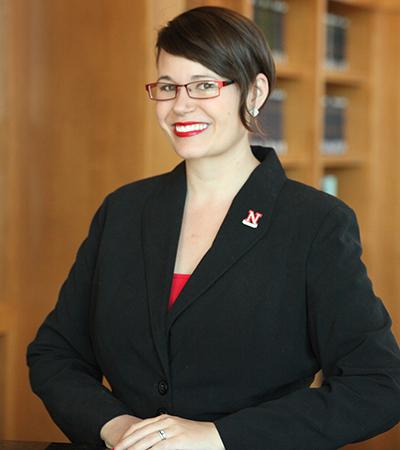
Magilton speaks at SXSW Festival on Space Law
01 Apr 2021
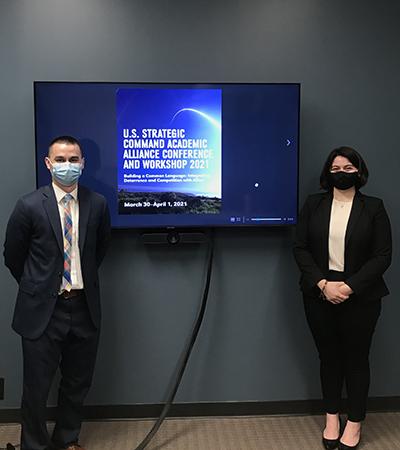
Students Present at U.S. Strategic Command Conference
31 Mar 2021
Amelia Ruffolo, ’23, and Josh Lee, ’22, presented a paper at the US Strategic Command Academic Alliance conference on March 30th. They co-authored a paper with the Space, Cyber, and Telecommunications Law executive director, Elsbeth Magilton, titled “Diplomatic Impact in the Stars? A Legal and Policy Review of the Impact of the Artemis Accords on Global Relationships.” In 2020 the U.S. began a push for a series of bilateral agreements, called the Artemis Accords. These agreements underscore existing multilateral agreements in space, such as the Outer Space Treaty, while also reinforcing U.S. interpretation of international law. Their impact on allied and adversarial relationships globally aligned with the 2021 USSTRATCOM Academic Alliance conference, sponsored by the University of Nebraska Omaha, the U.S. Navel War College, and United Kingdom’s Defence Science and Technology Laboratory.
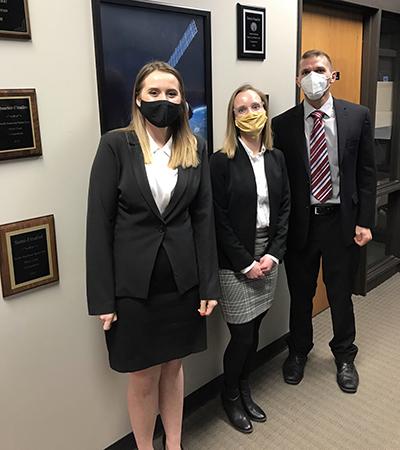
Nebraska Places in Quarter Finals at Space Law Moot Competition
31 Mar 2021
Nebraska Law students Leana Brown, ’22, Lauren Bydalek, ’22, and Martin Fischer, ’22, competed in the 2021 International Institute of Space Law Manfred Lachs Moot Court Competition March 26-27th. The competition was based on a hypothetical space law dispute before the International Court of Justice. Participating teams were required to submit a formal written argument for both the Applicant State and the Respondent State on the legal issues of the hypothetical case and to argue each side of the case before panels of judges in their respective region. Rooted in international law, this year’s competition focused on issues arising out of large satellite constellations including state responsibility, liability, and safety zones.
After an impressive two preliminary rounds the team advanced to quarter finals. There they impressed, but narrowly missed (.04 points) moving to the semi-final round, still outperforming over half of the teams in the competition. Professor Frans von der Dunk, Adam Little, ’12, and Executive Director Elsbeth Magilton, ’12, coached the team. Additionally, LL.M. alumnus Nathan Johnson, ’15, is now a regional organizer of the competition. Nebraska Law is extremely proud of its rich and continued history and involvement with this competition.
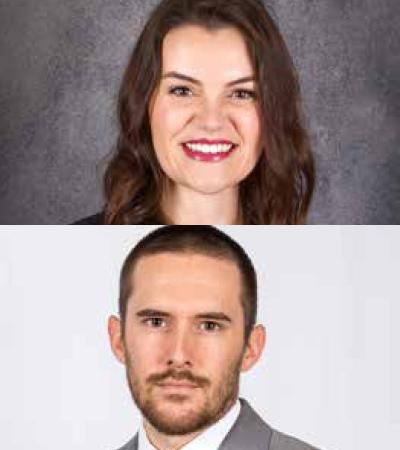
Immigration Clinic Students Hold Second Annual Naturalization Clinic at the College of Law
30 Mar 2021
On Saturday, March 27, 2021, students in the Immigration Clinic organized and ran the College of Law’s second annual naturalization clinic, through which community members were assisted in completing their applications to become U.S. citizens. Applicants were assisted primarily through remote means (Zoom), although some individuals chose to come in person.
Immigration Clinic students began community outreach this spring to publicize the clinic, including developing a flyer that was sent to Nebraska-based non-profit organizations who work with immigrants and sending flyers to local businesses that cater heavily to an immigrant clientele. As a result of these efforts, a total of 29 community members expressed interest in the services offered through the clinic.
Immigration Clinic students pre-screened all applicants to determine if there were any issues that might cause problems with their naturalization applications; 14 were determined to be good candidates for the clinic. An invitation was sent to the first 10 who applied; the remaining four people were put on a waiting list.
Immigration Clinic students Carly Burkhardt, '21, and Nick Grandgenett, '21, organized the clinic. In preparation, they recruited law students to participate, developed two different training sessions for the volunteers, conducted the trainings, and put in place the technology that allowed volunteers and applicants to complete applications remotely via Zoom. Law student volunteers and Immigration Clinic students made it possible to have interpreters on site in the following languages: Spanish, French, and Urdu.
 The day of the clinic, the Hamann Auditorium at the Law College was “command central” for the operations, since it allowed all volunteers to be present in the same physical space consistent with social distancing requirements. Volunteers and applicants were divided into two groups to allow for further distancing. For those applicants who elected to participate in person, volunteers met with them in rooms at the College of Law that would accommodate the appropriate number of people.
The day of the clinic, the Hamann Auditorium at the Law College was “command central” for the operations, since it allowed all volunteers to be present in the same physical space consistent with social distancing requirements. Volunteers and applicants were divided into two groups to allow for further distancing. For those applicants who elected to participate in person, volunteers met with them in rooms at the College of Law that would accommodate the appropriate number of people.
Eight of the ten invitees participated. Those applicants who attended in person were given a packet that included their completed forms, as well as a “next steps” set of instructions about how to submit the naturalization applications. For those who attended remotely, packets were assembled and mailed to them the week following the clinic.
In the post-event de-brief, volunteers enjoyed a box lunch graciously provided by the Cline Williams law firm and participated in robust discussion on suggestions for future clinics.
Immigration Clinic students this semester are:
- Madeline Branstetter
- Carly Burkhardt (naturalization clinic organizer)
- Nick Grandgenett (naturalization clinic organizer)
- Aja Martin
- Mauricio Murga Rios
- Luciano Ramirez Guerra
- Olivia Russell
- Sara Tonjes
Several additional students participated in the naturalization clinic, including:
- Alejandra Ayotitla
- Alicia Christensen
- Hannah Cook
- Shana Drengenberg
- Emma Lindemeier
- Jena Mahin
- Jordan Mason
- Natasha Naseem
- Sarah O’Neill
- Christopher Schmidt
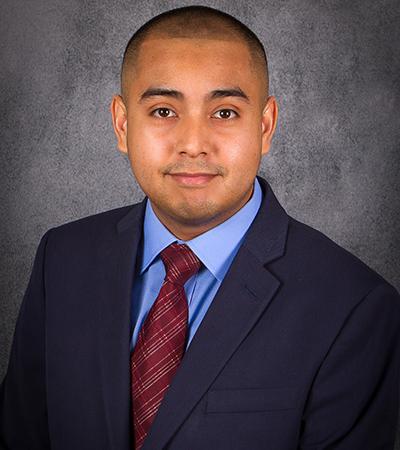
Murga Rios Awarded Immigrant Justice Corps Fellowship
19 Mar 2021
Mauricio Murga Rios, ’21, has been awarded an Immigrant Justice Corps (IJC) Fellowship, becoming the first Nebraska Law student to receive the highly sought-after honor. Murga Rios is one of twenty-eight law school graduates across the country to be part of the seventh class of Justice Fellows. Selected for their compassion, intellect, and commitment to immigrants’ rights, the 2021 Justice Fellows will bring their many skills to bear on the acute representation crisis in immigration.
Murga Rios comes to IJC with a stellar background and impressive experience. He spent his first law school summer working for an immigration attorney, where he helped immigrants fleeing violence from their home country remain in the United States. Last summer, he worked for the L.A. County Public Defender Immigration Unit, where he equipped criminal defense attorneys with the resources necessary to preserve their immigrant clients’ status and/or eligibility for future immigration relief. Now is his final semester at Nebraska Law, Murga Rios represents low-income immigrants as part of the College’s Immigration Clinic.
“Receiving this fellowship is a great honor,” says Murga Rios. “I chose IJC because I will receive unmatched training and the support necessary to provide exceptional legal advocacy for the immigrant community. The Fellowship will allow me to connect with true advocates nationwide, and I will have access to resources and the opportunity to learn from the best. I want to be the best because people without access to a lawyer need and deserve the best.” Murga Rios explained.
Murga Rios’ IJC Fellowship takes him to Catholic Charities of Central Florida, where he will provide access to lifesaving representation to immigrants on a wide range of affirmative and defensive cases. When he begins his two-year fellowship this fall, he will carry forward Nebraska Law’s proud legacy of public service and its mission of serving those in need.
IJC is the first fellowship program in the United States dedicated to providing immigrants with high-quality legal representation. IJC identifies promising lawyers and advocates passionate about immigration, places them in legal services and community-based organizations where they can make the greatest difference and supports them in training and expert insights as they directly assist immigrants in need. “I am confident that the 2021 Justice Fellows, with their impressive backgrounds and commitment to immigrants’ rights, will help IJC continue to meet the deep need for quality legal counsel which makes all the difference.” said IJC's founder, Robert A. Katzmann, Judge of the U.S. Court of Appeals for the Second Circuit.
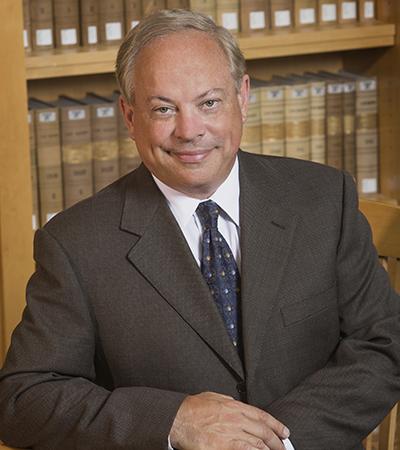
Beard Named Editor-In-Chief of Woomera Manual
15 Mar 2021
Professor Jack Beard has been elected to serve as the editor-in-chief of the Woomera Manual on the International Law of Military Space Operations. Previously, Beard served as a core expert and will continue to serve as a member of the Manual’s editorial and governance board.
The Woomera Manual will become the definitive document on military and security law as it applies to space. The project, set for completion in early 2022, draws on the knowledge and research of dozens of legal and space operations experts from around the world. Diplomatic and military representatives from numerous foreign governments have also already contributed to the project.
Beard is the co-director of Nebraska’s space, cyber, and telecommunications law program, teaching courses in international cyber security, national security space law and arms control. His primary research interests focus on public international law and national security law, with a particular emphasis on space law, cyber capabilities, and the law of armed conflict.
The University of Nebraska College of Law is one of the four founding institutions and principal sponsors of the Woomera Manual Project. In addition to Beard, Professor Frans von der Dunk serves as a core expert on the project.
Since 2008, Nebraska Law has offered an LL.M. degree in space, cyber, and telecommunications law, and broke ground in 2013 as the only doctoral-level space law program in the United States. Students explore the law and regulations of outer space activities and work with faculty on research that leads change in the industry and government.
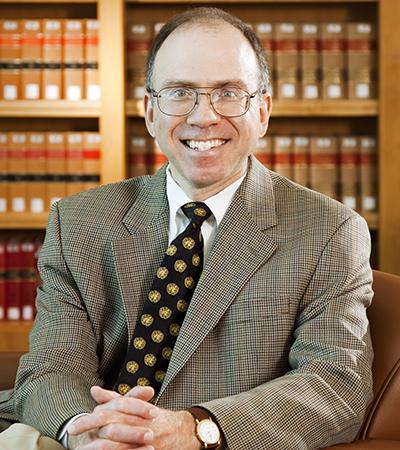
Lepard Publishes Article on the Responsibility to Protect Victims of Mass Atrocity Crimes
11 Mar 2021
Professor Brian Lepard has published an article entitled, “Challenges in Implementing the Responsibility to Protect: The Security Council Veto and the Need for a Common Ethical Approach,” in the Journal of Ethics.
The article focuses on the concept of a “responsibility to protect” (“R2P”) victims of mass atrocity crimes such as genocide, war crimes, and crimes against humanity, which was endorsed by the U.N. General Assembly in 2005. Despite some positive steps, the Security Council has failed to implement R2P consistently and has allowed terrible atrocities to unfold without authorizing meaningful intervention. These include the descent of Syria into brutal war with the direct targeting of civilians and safe places such as hospitals; the massacre of Yazidis by Islamic State forces in northern Iraq; the forced detention of Muslim Uighurs in “re-education camps” in China; and the mass rape and massacre of Rohingya Muslims in Myanmar. The Council has failed to reach agreement on what to do about these atrocities and has often been stymied by the exercise of the veto power by Russia and China, which are two of the five permanent Council members enjoying this power.
The article argues that a major reason for U.N. Security Council inaction has been a lack of agreement on how to reconcile the liberty of individuals and their security from mass atrocity crimes with the liberty and security of nations, including protecting them from unjustified forcible intervention. The article contends that a common ethical approach to protecting victims is required. It suggests some elements of an approach based on a principle of “unity in diversity,” and shows that these concepts find support in the U.N. Charter and international law, widely revered religious texts, and the writings of prominent ethicists. It clarifies the legal and ethical obligations of the U.N. Security Council related to a R2P in light of this approach and also investigates some reforms that ought to be implemented to limit the adverse impact of the veto on R2P action by the Council.
Professor Lepard is the Harold W. Conroy Distinguished Professor of Law at the University of Nebraska College of Law and a recognized expert on international human rights law.
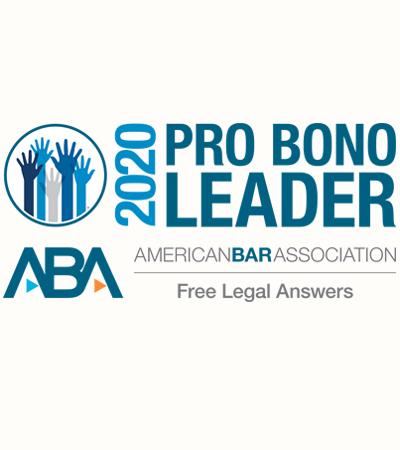
Nebraska Law Named American Bar Association Pro Bono Leader
05 Mar 2021
The University of Nebraska College of Law was recognized as a 2020 Pro Bono Leader for its dedication to pro bono work and participation in the American Bar Association’s Free Legal Answers Program. Nebraska Law is receiving this recognition for the third consecutive year.
The ABA Standing Committee on Pro Bono and Public Service presents annual recognition to individual attorneys, law firms and law departments that have provided extraordinary pro bono services through the ABA Free Legal Answers program.
As part of this virtual advice clinic, users post their civil legal questions to their state’s website. Attorney volunteers who are authorized to provide pro bono assistance select questions to answer and provide legal information and advice.
“Through this virtual clinic, our faculty and students are able to provide legal advice to more of the population, especially the low-income or rural populations that lack access to justice in our state.” said Dean Richard Moberly. “I am extremely proud of Nebraska Law’s continued participation in this program.”
The Pro Bono Leader distinction recognizes organizations that have collectively answered 75 or more questions during the calendar year, and individuals who answered 50 or more questions.
The Nebraska College of Law answered 127 total questions last year. Professors Kristen Blankley, Kevin Ruser and Ryan Sullivan each participated in this initiative, as did a number of Nebraska Law students.
“Last year brought challenges that no one expected,” said clinical associate professor Ryan Sullivan. “Answering questions through the Free Legal Answers Program was one way for the clinic and our students to support our community.”
Professor Sullivan also received individual recognition as a Pro Bono Leader. In addition to dedicating his own time to answering questions, Professor Sullivan supervised law students participating in this program.
